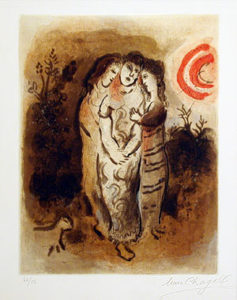 Last summer, when I joined Anshe Sholom B’nai Israel (ASBI), the local Modern Orthodox synagogue in Chicago’s Lakeview neighborhood, I discovered a multi-denominational congregation that, if not unique, was most certainly remarkable. Indeed, I’ve often wondered why, with equally vibrant Reform and Conservative congregations nearby, someone who’s not strictly Orthodox would choose to join a synagogue that is. But that’s another question for another essay. To my mind, the greatest merit of ASBI, which was thrown into sharp relief this week by the horrific massacre in Orlando, is that ours is a congregation whose membership renders denomination, race and sexual orientation meaningless – a community in which no one is an outsider.
Last summer, when I joined Anshe Sholom B’nai Israel (ASBI), the local Modern Orthodox synagogue in Chicago’s Lakeview neighborhood, I discovered a multi-denominational congregation that, if not unique, was most certainly remarkable. Indeed, I’ve often wondered why, with equally vibrant Reform and Conservative congregations nearby, someone who’s not strictly Orthodox would choose to join a synagogue that is. But that’s another question for another essay. To my mind, the greatest merit of ASBI, which was thrown into sharp relief this week by the horrific massacre in Orlando, is that ours is a congregation whose membership renders denomination, race and sexual orientation meaningless – a community in which no one is an outsider.
Seen through this prism, it now appears especially fitting that our first Women’s Leyning and Learning program was A Conversation About Megillat Ruth (The Book of Ruth).
If there’s one challenge in a diverse congregation such as ours, it’s creating educational programs with a broad appeal. After probing the hearts and minds of friends over the course of several months, I found that the topic was, in fact, secondary to the manner in which it was taught. This was the genesis of a new, interactive learning model.
When I sit down every Friday to read the weekly Torah portion over my morning coffee, the perspective I bring to the text is, first and foremost, literary – the textual, intertextual and contextual patterns, which, for me, to borrow JOFA’s coinage, are the true “joy of text.” And yet, I still marvel at the manner in which the Bible seamlessly lends itself to multi-disciplinary discourses.
There’s no shortage of educated women in our community, whose academic degrees and interests run the gamut from the arts and sciences to advanced Judaic studies. So, what if I asked them to draw upon their respective interests and take a fresh look at an old text? Call it wishful thinking, but, as I sought to convene these women for afternoon tea and a casual conversation, the plan seemed like a sure thing, even if a large turnout did not.
With Rabbanit Sara Wolkenfeld serving as facilitator and offering exegetical commentary on the story of Ruth and its relevance to ma’amad Har Sinai (standing at Mt. Sinai), the conversation flowed effortlessly for more than two hours. Two hours during which three generations of women tackled questions of law and love, of community and otherness, contributing insights that were, at once, thoughtful and thought provoking.
Like her or not, Ruth – her subservience and dependency notwithstanding – commands our attention. Amid the uncertainties of continuity and heredity that plague this patriarchal society, Ruth, a childless widow with no means of support and no one to care for her, ties her fate to another woman – her elderly mother-in-law, Naomi. Moreover, even as she renounces her religious affiliation and her people (an accursed race everywhere in the Bible but here), she is and remains Ruth the Moabite to the last.
Still basking in the afterglow of a scintillating evening when Sharon Weiss Greenberg, JOFA’s Executive Director, asked me to write about the gathering, news of the Orlando massacre rapidly turned my ineffable joy into dismay. Like many others, I felt compelled to do something – to express my sympathy for and solidarity with the LGBT community. I located the email I’d received from the Israeli Consulate, inviting me to walk with them and the ADL in the upcoming Gay Pride Parade, and I registered. But, as I turned my thoughts back to this blog, I had to wonder: How might our conversation about Ruth – a woman and a foreigner – have played out in light of the shooting?
Is this, as some scholars contend, a story of acceptance or tolerance? Is the magnanimity ascribed to Boaz to be read as an act of altruism or condescension? Can his marriage to – rather, purchase of – this Moabite truly elevate her in the eyes of the community elders? Which is to say, can she ever be “like Rachel and like Leah?” If, as Goethe observed, the Book of Ruth is nothing more than “the loveliest little epic and idyllic entity” whose “high intention… is to give a king of Israel decent and interesting ancestors,” why is the pious and faithful titular heroine summarily effaced with a stroke of the author’s pen?
Words celebrate. Words debase. They are part and parcel of our social diversity – of the social and moral fabric that defines us. Words unite. Words divide. Now, more than ever, it is incumbent upon us to choose our words carefully.
Copyright © 2016 Timna M. Hurwich. All rights reserved.